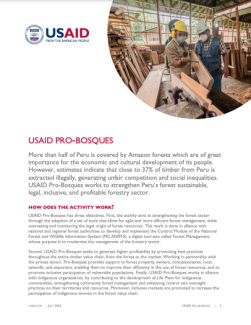More than half of Peru is covered by Amazon forests which are of great importance for the economic and cultural development of its people. However, estimates indicate that close to 37% of timber from Peru is extracted illegally, generating unfair competition and social inequalities. USAID Pro-Bosques works to strengthen Peru’s forest sustainable, legal, inclusive, and profitable forestry sector.
HOW DOES THE ACTIVITY WORK?
USAID Pro-Bosques has three objectives. First, the activity aims at strengthening the forest sector through the adoption of a set of tools that allow for agile and more efficient forest management, while overseeing and monitoring the legal origin of forest resources. This work is done in alliance with national and regional forest authorities to develop and implement the Control Module of the National Forest and Wildlife Information System (MC-SNIFFS), a digital tool also called Forest Management, whose purpose is to modernize the management of the forestry sector.
Second, USAID Pro-Bosques seeks to generate higher profitability by promoting best practices throughout the entire timber value chain, from the forest to the market. Working in partnership with the private sector, Pro-Bosques provides support to forest property owners, concessionaires, local sawmills, and exporters, enabling them to improve their efficiency in the use of forest resources, and to promote inclusive participation of vulnerable populations. Finally, USAID Pro-Bosques works in alliance with indigenous organizations, by contributing to the development of Life Plans for indigenous communities, strengthening community forest management and enhancing control and oversight practices on their territories and resources. Moreover, inclusive markets are promoted to increase the participation of indigenous women in the forest value chain.
RESULTS
- First Peruvian information system (MC-SNIFFS) being developed for the verification of the legal origin of wood in the country, which will be implemented by SERFOR at prioritized sites and checkpoints along Amazonian timber corridors.
- 15 control and oversight committees (CVC) formalized, trained and equipped in Ucayali and Loreto work in coordination with the Regional Forestry and Wildlife Control and Surveillance Bureau (MRCVFFS) and indigenous organizations in both regions.
- CITEforestal Maynas (Loreto), CITEforestal Pucallpa (Ucayali), CITEproductivo Madre de Dios and CITEmadera (Lima) improved the quantity and quality of the services they provide to forest users, allowing them to improve their competitiveness in areas of production, capacity building, access to markets and financing focusing on timber in Loreto and Ucayali and Brazilian nuts in Madre de Dios.
- Small forest producers’ associations, in alliance with municipalities and SERFOR, strengthened their adaptive forest management in three local forests in Ucayali and one in Loreto.
- The private sector strengthened management practices to ensure the legal origin and traceability of timber.
- National indigenous organizations and the Peruvian government promote an Indigenous Forest Agenda to foster a more inclusive participation of indigenous communities.
- 16 indigenous communities in Loreto and Ucayali have greater territorial legal security: implement their Life Plans in coordination with their representative organizations and the relevant authorities to develop 31 sustainable biodiversity management initiatives, such as: turtle management, sustainable fisheries, enrichment of bijao leaves, handcrafts, and palm tree management.

